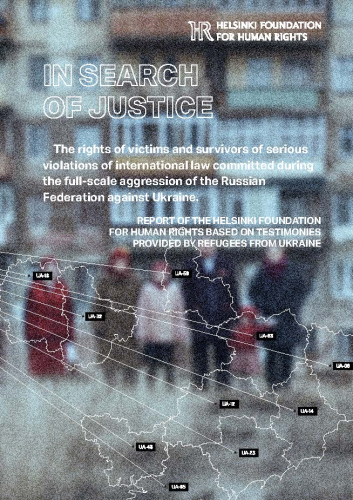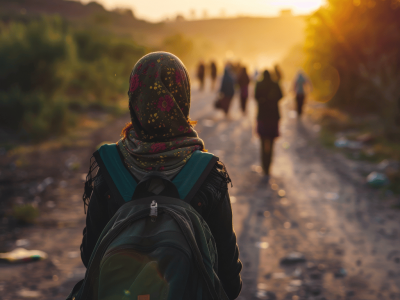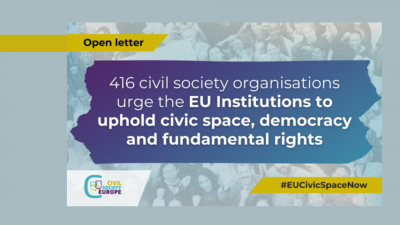In Search of Justice. The rights of victims and survivors of serious violations of international law committed during the full-scale aggression of the Russian Federation against Ukraine
The report of Helsinki Foundation for Human Rights (HFHR) highlights the stories of refugees from Ukraine, who experienced serious violations of international humanitarian law (IHL) and gross violations of international human rights law (IHRL), such as torture, inhuman or degrading treatment; conflict related sexual violence; or enforced disappearances. The document contains recommendations, primarily for the attention of the Polish authorities, proposing policy measures that can increase the effectiveness of the criminal investigations into violations of international law committed in Ukraine; and offer rehabilitation support (e.g., medical care, psycho-social services, and legal aid) for the individuals whose lives were adversely impacted.
Since Russia’s full-scale invasion against Ukraine, which began on 24 February 2022, the United Nations (UN), other international organizations, and civil society groups have documented serious violations of international humanitarian law (IHL) and gross violations of international human rights law (IHRL) - committed primarily by the Russian Federation armed forces.
HFHR joined these documentation efforts to support transitional justice mechanisms in Ukraine, such as criminal investigations against the perpetrators, and comprehensive reparations for the victims and survivors.
The Russian Federation, as the aggressor in the war, whose armed forces are the perpetrators of most of the documented violations, is responsible for ending the atrocities and repairing the harm caused. However, in the absence of Russia’s willingness to do so, Ukraine, supported by other States, is stepping in to address the rights of the victims and survivors (including the rights to justice and reparation).
HFHR urges the authorities in Poland to consider the following steps to support these efforts:
-
Create a dedicated unit within the Office of the General Prosecutor to investigate crimes under international law.
Such a unit should work within the framework of a comprehensive strategy and receive the necessary resources to increase the technical capacity, specialized training and knowledge. Proper outreach and support measures for witnesses, victims and survivors (among the refugee population in Poland) willing to speak to the investigative mechanisms should be ensured.
-
Carry out an analysis of the current legal system, overseen by the Ministry of Justice, and consider the possibility of prosecuting cases related to crimes under international law before Polish courts.
Poland, as a country committed to the rule of law and international justice (and as a state bordering Ukraine and hosting a large number of refugees) is in a unique position to support access to justice for victims and survivors of crimes under international law. Considering the scale and number of the committed crimes, universal jurisdiction exercised in countries such as Poland can help fight impunity.
-
Adopt necessary policies and regulations to ensure access to comprehensive and urgent assistance for the victims and survivors, who are refugees in Poland, unable to return to their homes in the immediate future.
Poland can implement its international commitments, including the UN Basic Principles and Guidelines on the Right to a Remedy and Reparation for Victims of Gross Violations of International Human Rights Law and Serious Violations of International Humanitarian Law, by ensuring that refugee victims and survivors of serious violations of international law are identified by the relevant authorities and institutions, and provided with prompt access to appropriate rehabilitation services. Such support can help people overcome the medical, financial, and social impacts of the atrocities suffered. Out of 1 million refugees in Poland, around 50% are employed and according to the recent report by UNHR and Deloitte refugees contribute around 1% to Polish GDP.2 However, many refugees continue to face multiple vulnerabilities and require specialized assistance – this includes victims of most serious violations, such as torture, crimes of sexual violence or the disappearance of a loved one. Many may suffer psychological consequences impacting their ability to work and function, or struggle to cover the cost of medical treatment related to the physical injuries they suffered.
-
Create a multidisciplinary working group on access to justice and reparation for victims and survivors of serious violations of international law.
Such working group should be comprised of representatives of the relevant ministries, prosecutors, legal experts specializing in international law, NGOs, and other actors to ensure a regular framework for collaboration and effective exchange of information related to the investigation of crimes under international law and access to justice for the victims and survivors, as well as their access to rehabilitation support and international protection in Poland.
The international community's support is crucial to ensure accountability for the committed crimes. Continued financial and technical assistance must be provided to authorities in Ukraine, civil society actors, and international organizations to support transitional justice initiatives focused on access to justice and reparation, as well as urgent assistance for all victims and survivors of crimes under international law, including refugees.



